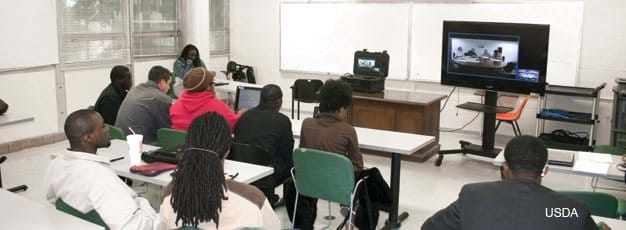ERS Innovates as It Expands Distance Learning Ventures With Minority-Serving Institutions

In 2007, ERS launched a distance learning initiative as part of an ongoing commitment to student outreach and to the development of a more diverse community of agricultural economists and policy analysts within USDA. The initiative utilizes innovative methods to link ERS with students at minority-serving universities by providing teaching and discussions relevant to both ERS research and the students’ curricula.
The distance learning program, which now includes seven institutions, aims to:
- Expand the number and diversity of faculty and students with policy analysis expertise at those institutions;
- Build stronger relationships with 1890 Land-Grant Universities, 1994 Tribal Colleges and Universities, and the Hispanic Association of Colleges and Universities;
- Strengthen collaborative networks among minority-serving institutions; and
- Allow students to take advantage of ERS researchers’ expertise in a variety of subjects.
The desire to find ways to expand participation and still maintain opportunities for meaningful contact among students, faculty, and ERS staff has been paramount since the project’s inception. Over 40 ERS economists have given presentations and/or interacted directly with more than 120 students and faculty during class sessions and afterward with followup e-mails and telephone conversations.
During the first 2 years of the project, the principal mode of communication was video conferencing, which allowed students and faculty to interact with ERS specialists in real time. As the number of participating institutions grew, ERS switched to a technology that allows for interaction with up to 100 computer workstations at various institutions simultaneously. One of the participating institutions has established an electronic learning management system to facilitate continuous questions and answers between students at participating institutions and ERS specialists hosting the interactive sessions remotely.
Through this program, ERS has been able to demonstrate the value of sound economic research in domestic and trade policy development and in market and consumer analysis. Perhaps most importantly, the goal of the distance learning program is to increase student interest in pursuing careers in agricultural economics or agriculture in general. The program has resulted in expanded student interest and participation in the ERS Summer Internship Program, increased permanent employment of students, and greater contact with faculty and administrators from participating institutions.
In delivering on a commitment to build stronger relationships with minority-serving institutions, ERS has also learned to use new technologies more effectively to reach new and dispersed audiences and has benefited greatly from these efforts.

